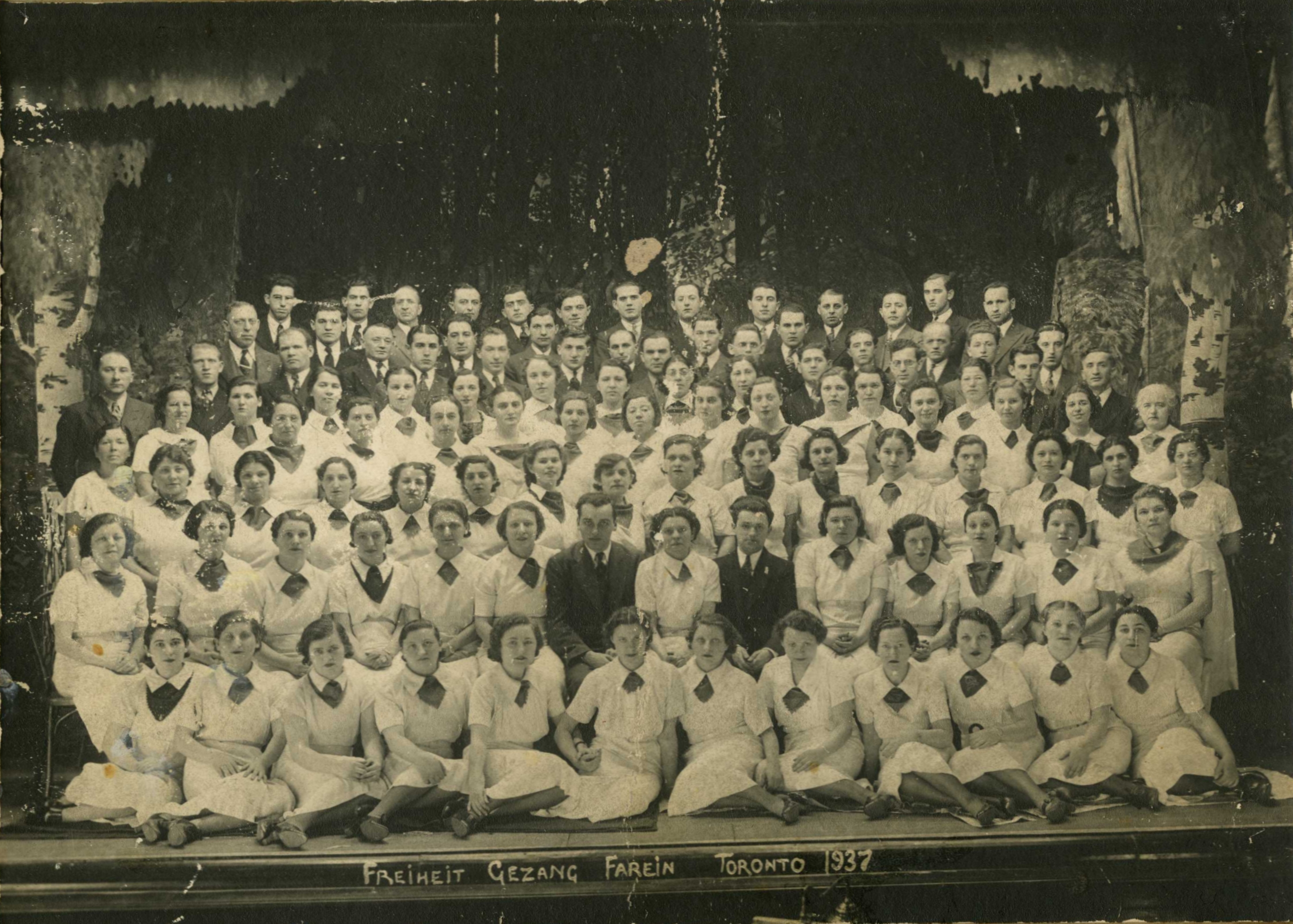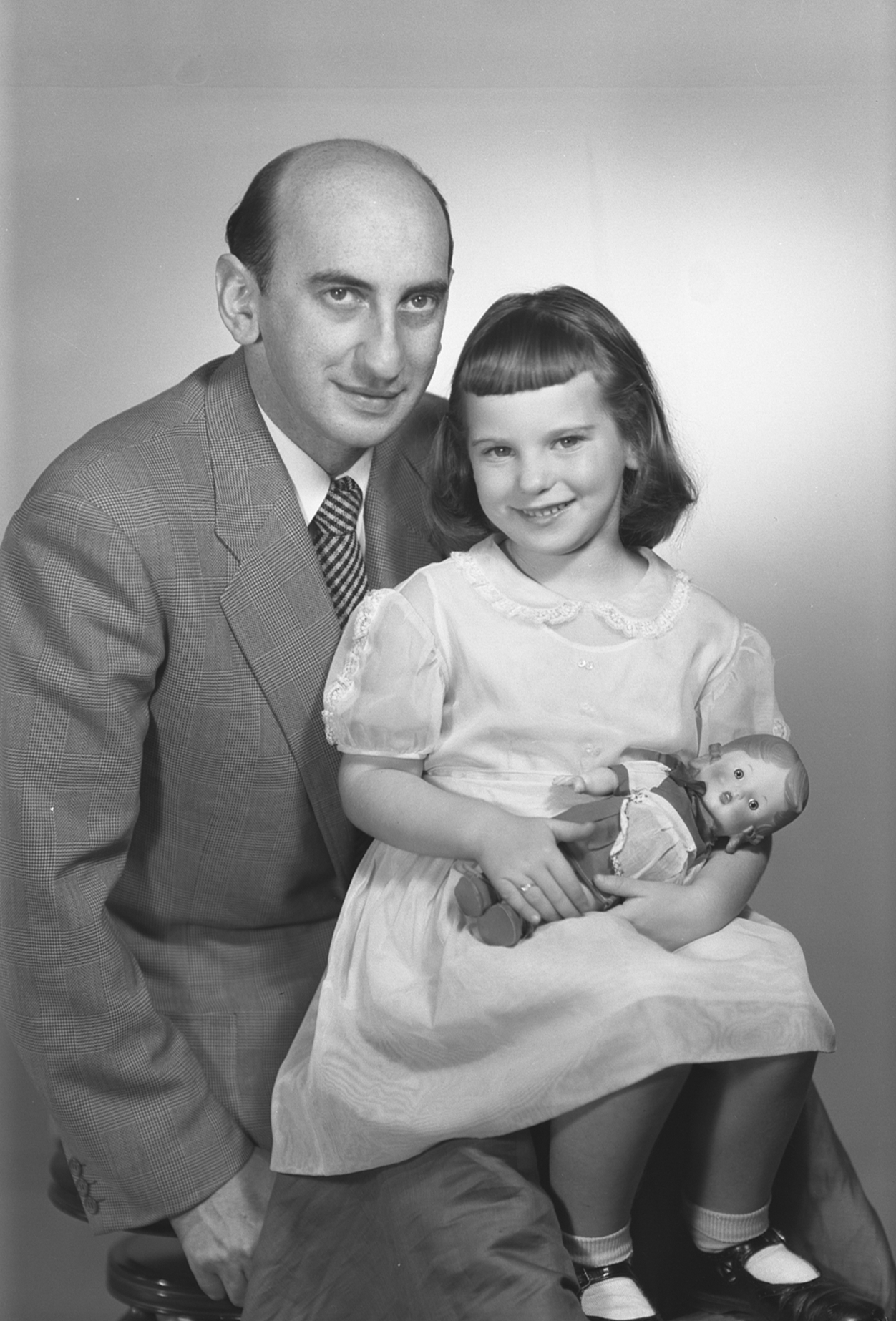Toronto Jewish Folk Choir
 The Toronto Jewish Folk Choir was first conceived in 1925 by a group of young, working-class immigrant factory workers. It was initially known as the Freiheit Gezangs Farein (Freedom Singing Society), and its precursor may have been regarded as The Young Socialist Choir, which was active circa 1914–1917. Under the name Freiheit Gezangs Farein, the choir began annual spring concerts in 1926 conducted by Hyman Riegelhaupt with the goal to keep Yiddish culture alive and to familiarize Jewish music everywhere through every possible medium.
The Toronto Jewish Folk Choir was first conceived in 1925 by a group of young, working-class immigrant factory workers. It was initially known as the Freiheit Gezangs Farein (Freedom Singing Society), and its precursor may have been regarded as The Young Socialist Choir, which was active circa 1914–1917. Under the name Freiheit Gezangs Farein, the choir began annual spring concerts in 1926 conducted by Hyman Riegelhaupt with the goal to keep Yiddish culture alive and to familiarize Jewish music everywhere through every possible medium.
The Toronto Jewish Folk Choir was the new English name given to the Freiheit Gezangs Farein when the intensification of fascism and the outbreak of World War II led to the choir's attempt to reach a wider audience. Riegelhaupt conducted the choir for eleven years and was then succeeded by Henry Dobkowski, who was with the choir for two seasons. At that time, the choir's repertoire consisted mainly of Yiddish and Hebrew folk songs and operettas that reflected the struggles and aspirations of the Jewish community and the working class.
 Though the composer Jacob Schaefer was a guest conductor in 1928, 1935, and 1936, Emil Gartner (1914–1960) succeeded Dobkowski in 1939, which brought with it several significant changes for the choir, the result of the changing climate of world politics and Gartner’s dynamism. During his tenure, the choir grew to over 130 members and activities increased from one concert a year to several a year, with sold-out performances at Massey Hall, engagement with the CBC and with artists such as the Toronto Symphony Orchestra, Lois Marshall, Jennie Tourel, Jan Peerce, and Paul Robeson. Even at the height of the Toronto Jewish Folk Choir’s fame, the choir retained its working-class character and most of its members still learned their parts by ear.
Though the composer Jacob Schaefer was a guest conductor in 1928, 1935, and 1936, Emil Gartner (1914–1960) succeeded Dobkowski in 1939, which brought with it several significant changes for the choir, the result of the changing climate of world politics and Gartner’s dynamism. During his tenure, the choir grew to over 130 members and activities increased from one concert a year to several a year, with sold-out performances at Massey Hall, engagement with the CBC and with artists such as the Toronto Symphony Orchestra, Lois Marshall, Jennie Tourel, Jan Peerce, and Paul Robeson. Even at the height of the Toronto Jewish Folk Choir’s fame, the choir retained its working-class character and most of its members still learned their parts by ear.
After Gartner's 1960 death in an automobile crash, the Toronto Jewish Folk Choir operated under Douglas Webb and Esther Cronenberg (1960s), Searle Freedman (1971–1975), Melvyn Isen (1975–1978), Bill Phillips (1978–1987), Voltr Ivonoffski (1987–1990), David Varjabed (1990–1993), and Esther Ghan Firestone (1993–2002). Alexander Veprinsky became the conductor in 2002 and maintained the position until 2012. Lina Zemelman, the piano accompanist beginning in 1976, has maintained her position, 2012 marking her thirty-sixth year with the choir. Among the choir's chief administrators and major supporters after Gartner's death, were Dr. Ben Z. Shek, chair of the program committee since the mid 1980s, and Jean Shek, who served as president and then co-president from the same time until 2005.
After Gartner's 1960 death in an automobile crash, the Toronto Jewish Folk Choir operated under Douglas Webb and Esther Cronenberg (1960s), Searle Freedman (1971–1975), Melvyn Isen (1975–1978), Bill Phillips (1978–1987), Voltr Ivonoffski (1987–1990), David Varjabed (1990–1993), and Esther Ghan Firestone (1993–2002). Alexander Veprinsky became the conductor in 2002 and maintained the position until 2012. Lina Zemelman, the piano accompanist beginning in 1976, has maintained her position, 2012 marking her thirty-sixth year with the choir. Among the choir's chief administrators and major supporters after Gartner's death, were Dr. Ben Z. Shek, chair of the program committee since the mid 1980s, and Jean Shek, who served as president and then co-president from the same time until 2005.
In 2012, the choir, comprised of some thirty-five members and housed at the Winchevsky Centre, continued to sing in many languages including English, French, Russian, Hebrew, Yiddish, and Ladino. They have appeared at Toronto's biennial Ashkenaz Festival in 2012. The choir has also continued to give an annual spring concert in Toronto and performed for Jewish Music Month, the annual commemorations of the Warsaw Ghetto uprising, tribute concerts, and on other occasions like Hanukkah. The ensemble has been featured at the Toronto International Choral Festival and at Festival Canada in Ottawa (1997) and has performed in Montreal and Toronto’s famed Massey Hall.
Today, the Toronto Jewish Folk Choir has kept alive its founding spirit and the Yiddish language by performing beloved folk songs; classics with Jewish themes; and contemporary music by Jewish composers in Yiddish, Hebrew, Judeo-Spanish (Ladino), Russian, and English; as well as music of other lands and cultures.